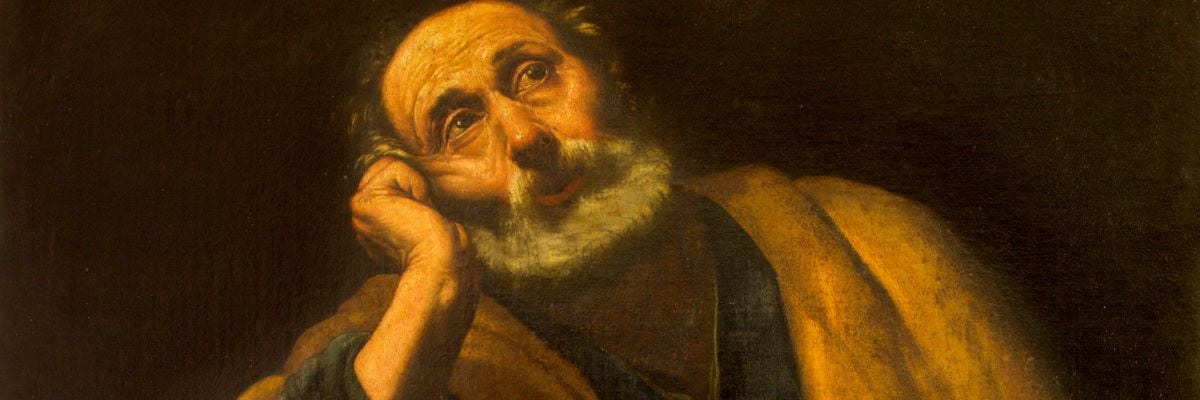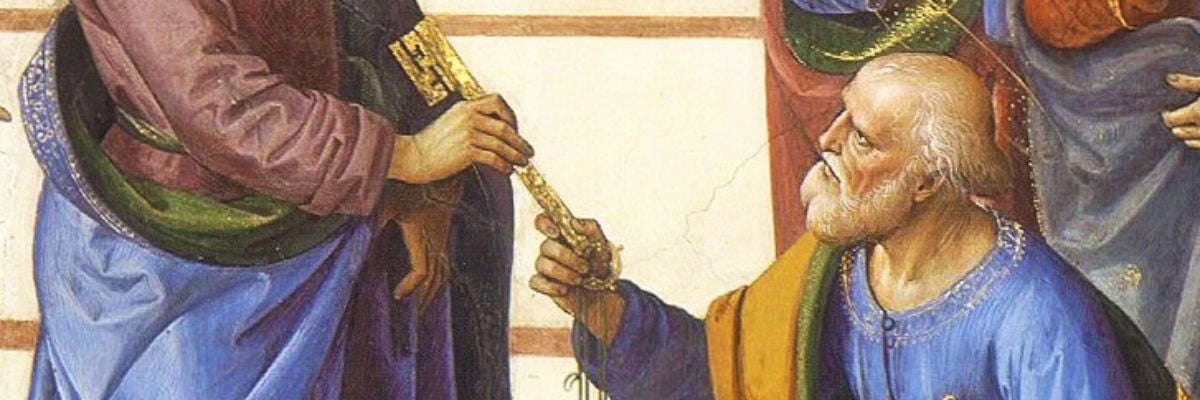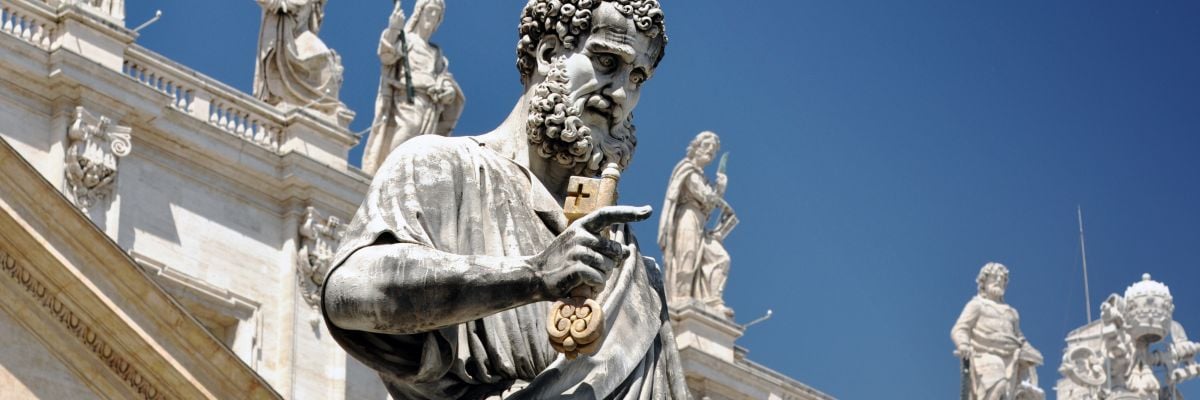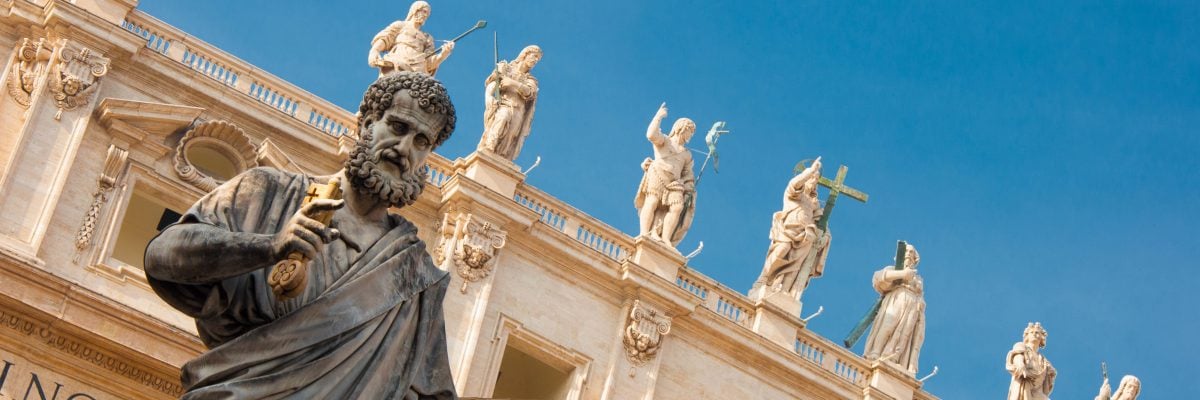Votar Roja
Diamond Member
- Sep 11, 2023
- 3,095
- 3,030
- 1,893
- Banned
- #1
(Written by ME so there are no links, but I will provide supporting links.)
The Pope
I'm sure we all know THIS scripture, which most Christians argue over, by heart by now:
I'll try to make clear what the Pope actually is. Many people have mistaken ideas about what the Pope is, which is why they don't see the office in scripture.
Simply, the Pope is the fulfillment of the office of Prime Minister that existed in the Kingdoms of David and his successors, just as many things in the New Testament are fulfillments of their Old Testament "types".
In the Davidic Kingdoms, there was the office of Prime Minister (who actually wore a key on his robe as a symbol of office). This position is what is referred to in the above text and in other historical documents. There were many "ministers" to the king, but only one Prime Minister, sometimes known as the "Vizier" of the House of David.
So now let's fast-forward to the New Testament: JESUS is the King, the "son of David", in the line of David. So, the apostles, steeped in their Jewish culture, knew EXACTLY what it meant when Jesus gave Peter the "Keys". Peter was to be the Prime Minister of Christ's Kingdom, the "Keeper of the Keys".
So this is what the Pope is: He is Prime Minister of the King's Kingdom: The King's representative, or "vicar" if you will. But the Pope also has a pastoral role, which is established in John 21: 15-17, when Christ told Peter: "feed my lambs.. ..feed my sheep.. ..tend my sheep."
This is the Pope: Prime Minister of Christs Kingdom, and Pastor of the flock. With that in mind, the Papacy is ALL THROUGH the scriptures. Now, throw into that mix the fact there is ample evidence in the New Testament that Peter was first in authority among the apostles. Whenever they were named, Peter headed the list (Matt. 10:1-4, Mark 3:16-19, Luke 6:14-16, Acts 1:13) ; sometimes the apostles were referred to as "Peter and those who were with him" (Luke 9:32). Peter was the one who generally spoke for the apostles (Matt. 18:21, Mark 8:29, Luke 12:41, John 6), and he figured in many of the most dramatic scenes (Matt. 14:28-32, Matt. 17:24-27, Mark 10:23-28 ) . On Pentecost it was Peter who first preached to the crowds (Acts 2:14-40), and he worked the first healing in the Church age (Acts 3:6-7). It is Peter’s faith that will strengthen his brethren (Luke 22:32) and, as I said, Peter is given Christ’s flock to shepherd (John 21:17). An angel was sent to announce the resurrection to Peter (Mark 16:7), and the risen Christ first appeared to Peter (Luke 24:34). He headed the meeting that elected Matthias to replace Judas (Acts 1:13-26), and he received the first converts (Acts 2:41). He inflicted the first punishment (Acts 5:1-11), and excommunicated the first heretic (Acts 8:18-23). He led the first council in Jerusalem (Acts 15), and announced the first dogmatic decision (Acts 15:7-11). It was to Peter that the revelation came that Gentiles were to be baptized and accepted as Christians (Acts 10:46-48 ) .
So, as Cyprian of Carthage said in 251 A.D. (almost a hundred years before Constantine):
Much more info can be found here if you are interested:

 www.catholic.com
www.catholic.com

 www.catholic.com
www.catholic.com

 www.catholic.com
www.catholic.com
The Pope
I'm sure we all know THIS scripture, which most Christians argue over, by heart by now:
- "...Simon Peter answered, "You are the Christ, the Son of the living God." And Jesus said to him, "Blessed are you, Simon Barjona, because flesh and blood did not reveal this to you, but My Father who is in heaven. I also say to you that you are Peter, and upon this rock I will build My church; and the gates of Hades will not overpower it. I will give you the keys of the kingdom of heaven; and whatever you bind on earth shall have been bound in heaven, and whatever you loose on earth shall have been loosed in heaven."
I'll try to make clear what the Pope actually is. Many people have mistaken ideas about what the Pope is, which is why they don't see the office in scripture.
Simply, the Pope is the fulfillment of the office of Prime Minister that existed in the Kingdoms of David and his successors, just as many things in the New Testament are fulfillments of their Old Testament "types".
- "And it shall come to pass in that day, that I will call My servant Eliakim the son of Helcias, and I will clothe him with thy Robe, and I will strengthen him with thy Sash, and will give thy Power (authority) into his hand; and he shall be as a FATHER (the word 'Pope' means 'Father') to the inhabitants of Jerusalem, and to the house of Judah. And I will lay the Key of the House of David (the symbol of primacy) upon his shoulder; and he shall open and none shall shut; and he shall shut and none shall open. And I will fasten him as a peg in a Sure Place(the Papal Office), and he shall be for a Throne of glory to the house of his Father. And they shall hang upon him all the glory of his Fathers house, diverse kinds of vessels, every little vessel, from the vessels of cups even to every instrument of music." (Isaiah 22:20-24)
In the Davidic Kingdoms, there was the office of Prime Minister (who actually wore a key on his robe as a symbol of office). This position is what is referred to in the above text and in other historical documents. There were many "ministers" to the king, but only one Prime Minister, sometimes known as the "Vizier" of the House of David.
So now let's fast-forward to the New Testament: JESUS is the King, the "son of David", in the line of David. So, the apostles, steeped in their Jewish culture, knew EXACTLY what it meant when Jesus gave Peter the "Keys". Peter was to be the Prime Minister of Christ's Kingdom, the "Keeper of the Keys".
So this is what the Pope is: He is Prime Minister of the King's Kingdom: The King's representative, or "vicar" if you will. But the Pope also has a pastoral role, which is established in John 21: 15-17, when Christ told Peter: "feed my lambs.. ..feed my sheep.. ..tend my sheep."
This is the Pope: Prime Minister of Christs Kingdom, and Pastor of the flock. With that in mind, the Papacy is ALL THROUGH the scriptures. Now, throw into that mix the fact there is ample evidence in the New Testament that Peter was first in authority among the apostles. Whenever they were named, Peter headed the list (Matt. 10:1-4, Mark 3:16-19, Luke 6:14-16, Acts 1:13) ; sometimes the apostles were referred to as "Peter and those who were with him" (Luke 9:32). Peter was the one who generally spoke for the apostles (Matt. 18:21, Mark 8:29, Luke 12:41, John 6), and he figured in many of the most dramatic scenes (Matt. 14:28-32, Matt. 17:24-27, Mark 10:23-28 ) . On Pentecost it was Peter who first preached to the crowds (Acts 2:14-40), and he worked the first healing in the Church age (Acts 3:6-7). It is Peter’s faith that will strengthen his brethren (Luke 22:32) and, as I said, Peter is given Christ’s flock to shepherd (John 21:17). An angel was sent to announce the resurrection to Peter (Mark 16:7), and the risen Christ first appeared to Peter (Luke 24:34). He headed the meeting that elected Matthias to replace Judas (Acts 1:13-26), and he received the first converts (Acts 2:41). He inflicted the first punishment (Acts 5:1-11), and excommunicated the first heretic (Acts 8:18-23). He led the first council in Jerusalem (Acts 15), and announced the first dogmatic decision (Acts 15:7-11). It was to Peter that the revelation came that Gentiles were to be baptized and accepted as Christians (Acts 10:46-48 ) .
So, as Cyprian of Carthage said in 251 A.D. (almost a hundred years before Constantine):
- "The Lord says to Peter: ‘I say to you,’ he says, ‘that you are Peter, and upon this rock I will build my Church, and the gates of hell will not overcome it. And to you I will give the keys of the kingdom of heaven; and whatever things you bind on earth shall be bound also in heaven, and whatever you loose on earth, they shall be loosed also in heaven’ [Matt. 16:18–19]). ... On him [Peter] he builds the Church, and to him he gives the command to feed the sheep [John 21:17], and although he assigns a like power to all the apostles, yet he founded a single chair [cathedra], and he established by his own authority a source and an intrinsic reason for that unity. Indeed, the others were also what Peter was [i.e., apostles], but a primacy is given to Peter, whereby it is made clear that there is but one Church and one chair. So too, all [the apostles] are shepherds, and the flock is shown to be one, fed by all the apostles in single-minded accord. If someone does not hold fast to this unity of Peter, can he imagine that he still holds the faith? If he [should] desert the chair of Peter upon whom the Church was built, can he still be confident that he is in the Church?" - The Unity of the Catholic Church 4; 1st edition [A.D. 251]).
Much more info can be found here if you are interested:

Where Does the Bible Say Anything about the Papacy?
Where does the Bible mention the Pope? There are many texts that point to the papacy, but these three passages in the Gospels are particulalrly relevant.

The Papacy in Scripture: No Rocks Required
Matthew 16 is not the only text that demonstrates the truth of the papacy in Scripture. Here is a list of Bible verses that support the Catholic view.

Defending the Papacy
Fundamentalists denounce the pope online and in anti-papal tracts. Here we examine the top five arguments such critics typically make against the papacy.


